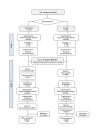Does teaching non-technical skills to medical students improve those skills and simulated patient outcome?
- PMID: 28355594
- PMCID: PMC5376493
- DOI: 10.5116/ijme.58c1.9f0d
Does teaching non-technical skills to medical students improve those skills and simulated patient outcome?
Abstract
Objectives: The purpose of this study is to evaluate the effects of a tailor-made, non-technical skills seminar on medical student's behaviour, attitudes, and performance during simulated patient treatment.
Methods: Seventy-seven students were randomized to either a non-technical skills seminar (NTS group, n=43) or a medical seminar (control group, n=34). The human patient simulation was used as an evaluation tool. Before the seminars, all students performed the same simulated emergency scenario to provide baseline measurements. After the seminars, all students were exposed to a second scenario, and behavioural markers for evaluating their non-technical skills were rated. Furthermore, teamwork-relevant attitudes were measured before and after the scenarios, and perceived stress was measured following each simulation. All simulations were also evaluated for various medical endpoints.
Results: Non-technical skills concerning situation awareness (p<.01, r=0.5) and teamwork (p<.01, r=0.45) improved from simulation I to II in the NTS group. Decision making improved in both groups (NTS: p<.01, r=0.39; control: p<.01, r=0.46). The attitude 'handling errors' improved significantly in the NTS group (p<.05, r=0.34). Perceived stress decreased from simulation I to II in both groups. Medical endpoints and patients´ outcome did not differ significantly between the groups in simulation II.
Conclusions: This study highlights the effectiveness of a single brief seminar on non-technical skills to improve student's non-technical skills. In a next step, to improve student's handling of emergencies and patient outcomes, non-technical skills seminars should be accompanied by exercises and more broadly embedded in the medical school curriculum.
Keywords: human patient simulation; medical students; non-technical skills; reliable teamwork; teamwork-relevant attitudes.
Figures
References
-
- Cannon-Bowers JA, Salas E. Team Performance and Training in Complex Environments. Current Directions in Psychological Science. 1998;7:83–87. doi: 10.1111/1467-8721.ep10773005. - DOI
Publication types
MeSH terms
LinkOut - more resources
Full Text Sources
Other Literature Sources


